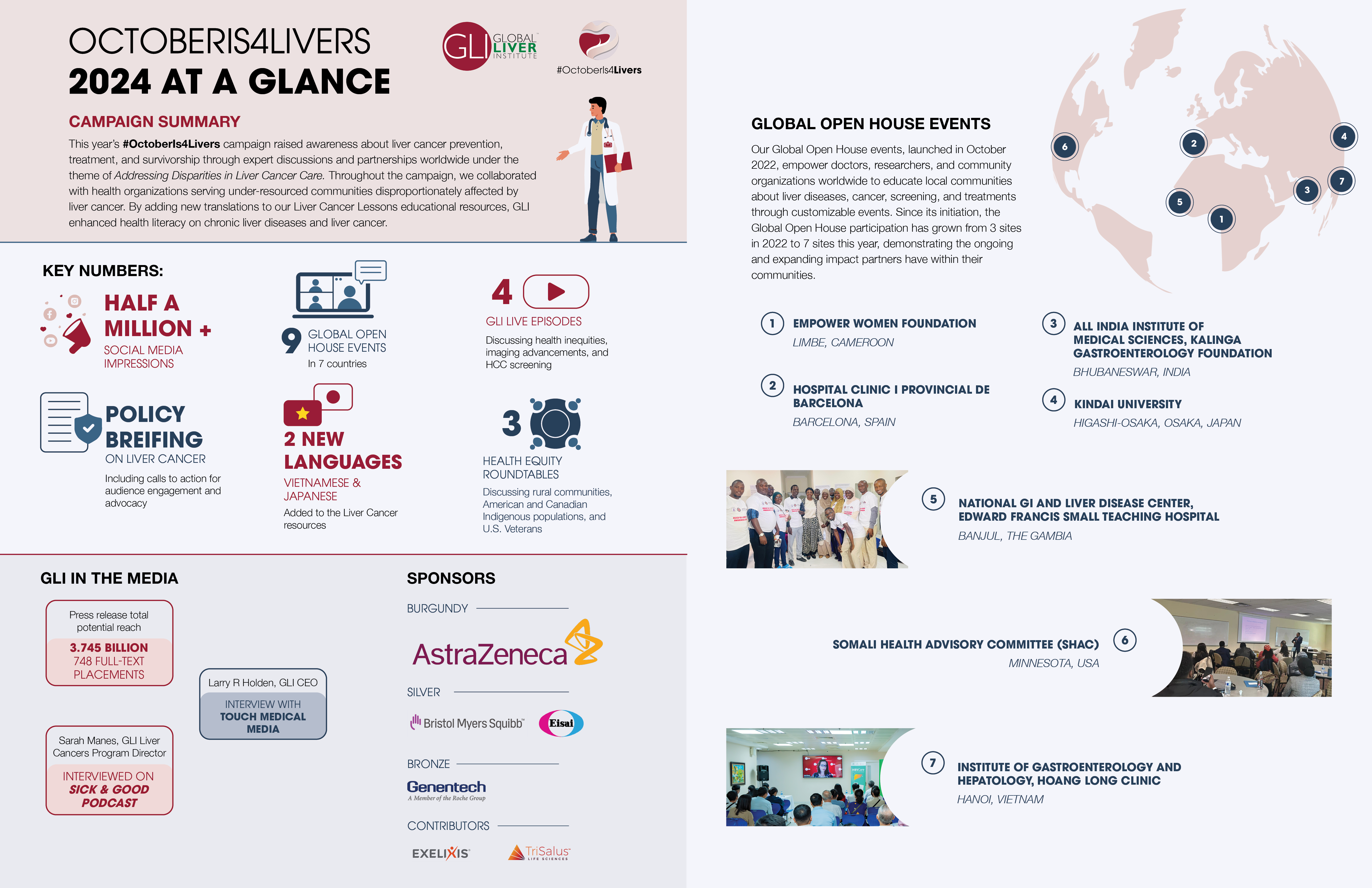
Uniting for Equity in Liver Cancer Care
This month at GLI, we’re excited to spotlight our Liver Cancer Program Director, Sarah Manes, as she dives into topics on advocacy, prevalence rates, risks, symptoms, treatment and survivorship for those affected with liver cancer on the Sick & Good: Cancer and Wellness podcast! You can also watch our Veterans Health Equity Webinar on our YouTube channel if you missed it. In the webinar, Sarah Manes is joined by leading VA providers to discuss health equity, liver cancer, and screening for Veterans. Continue to check out the GLI website for more!
In October, Global Liver Institute led its annual #OctoberIs4Livers campaign, focused on health equity and raising awareness about liver cancer through education, outreach, and advocacy. The campaign provided a variety of resources to advocates, including a newly developed patient toolkit to empower individuals and communities with the knowledge to improve liver health outcomes. The expert-led Health Equity Roundtable discussions and GLI LIVE sessions addressed liver health disparities in underserved communities such as rural populations, Veterans, and Native American groups.
Lower Association of Cirrhosis and Mortality for Patients Using Ozempic-like Drug in Veterans Study
A new study from JAMA found that Ozempic-like drugs are associated with a decreased risk of progression to cirrhosis. This study, which used data from the US Veterans Health Administration Corporate Data Warehouse and Central Cancer Registry, found that patients with metabolic dysfunction-associated steatotic liver disease (MASLD) and diabetes had a lower association of progression to cirrhosis and mortality when using GLP-1 RAs (glucagon-like peptide 1 receptor agonists). The study also highlighted the importance of preventive treatments and screening, since no protective effects were found for patients with pre-existing cirrhosis.
1 of 10 Veterans Diagnosed with Dementia May Instead Have Cognitive Decline from Cirrhosis
A study conducted by the Virginia Commonwealth University’s School of Medicine and the Richmond VA Medical Center found that up to 10% of older U.S. Veterans diagnosed with dementia may actually be experiencing reversible cognitive decline due to advanced liver disease. It can be challenging for healthcare providers to differentiate between dementia and cognitive decline caused by cirrhosis (known as hepatic encephalopathy or HE). If HE goes undetected, patients may miss out on treatments that could slow or reverse their cognitive issues. In the article in JAMA Network Open, Dr. Jasmohan Bajaj’s research team determined how frequently undiagnosed cirrhosis and potential hepatic encephalopathy are present in Veterans diagnosed with dementia and to identify related risk factors. The findings suggest that physicians treating Veterans with dementia should consider screening for liver disease even without a prior cirrhosis diagnosis because early detection could reveal reversible causes of cognitive decline and improve patient outcomes. To learn more regarding hepatic encephalopathy, watch GLI’s recent webinar!
2024 National Veterans Health Equity Report (NVHER)
Since 2021, the VA has released the National Veterans’ Health Equity Report, which highlights health equity, quality care, and disparities for Veterans seeking services at Veterans Health Administration facilities. This year’s special report focuses on female Veterans’ experiences within the VHA by race and ethnicity compared to male Veterans’ experiences. The findings and methodology found within the report will guide improvements for care experiences in women, men, and diverse racial and ethnic groups.
Racial and Ethnic Differences in Health Care Experiences for Veterans Receiving VA Community Care
A VA study examining administrative processes and health disparities in community-based care revealed that Black and Hispanic Veterans face greater challenges in accessing local healthcare services. The research, which focused on community care funded by the VA but delivered through non-VA facilities and providers, found that Black and Hispanic Veterans reported lower levels of care coordination, poorer provider communication, and difficulties with appointment scheduling and billing. Given the limited research on community care provided by non-VA facilities, this study offers foundational evidence for improving care experiences and outcomes for Black and Hispanic Veterans in these settings.
Stopping Liver Cancer Before It Starts
Researchers at the University of Miami’s Sylvester Comprehensive Cancer Center are studying genetic and environmental factors behind MASLD in Latino populations. MASLD, formerly known as non-alcoholic fatty liver disease (NAFLD), is a major risk factor for liver cancer. Research explores how social factors like diet and exercise influence disease progression with the end goal of enhancing early screening and prevention. Insights from this research could help develop personalized screening tools and promote culturally relevant dietary habits to reduce liver cancer risk.
Upcoming Events:
- November 8, 2024: Indian Country Infectious Disease ECHO Virtual clinic
- November 12, 2024: Elders, Knowledge Holders and Culture Keepers ECHO
- November 15-19, 2024: AASLD’s The Liver Meeting 2024
- Email us at info@globalliver.org to set up a meeting or visit Booth #846
- November 16, 2024: Oconomowoc VA Community-Based Clinic Open House
If you’re attending a conference in person and would like to meet with us, please reach out to info@globalliver.org to schedule a meeting. We look forward to connecting with you!
For more information about the Liver Cancers Council or to learn more about joining, please visit https://globalliver.org/liver-cancers-council/ or email cancer@globalliver.org



